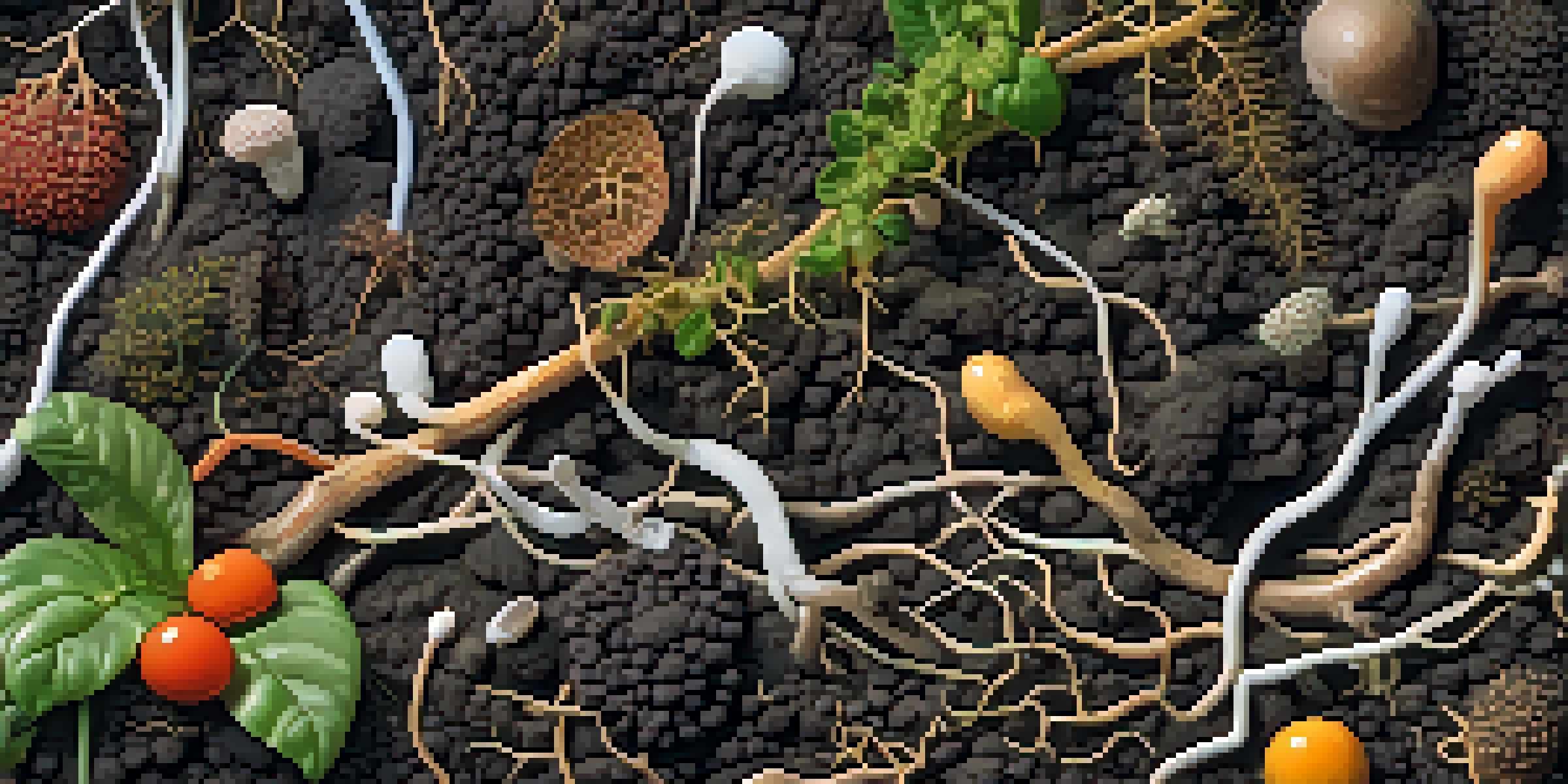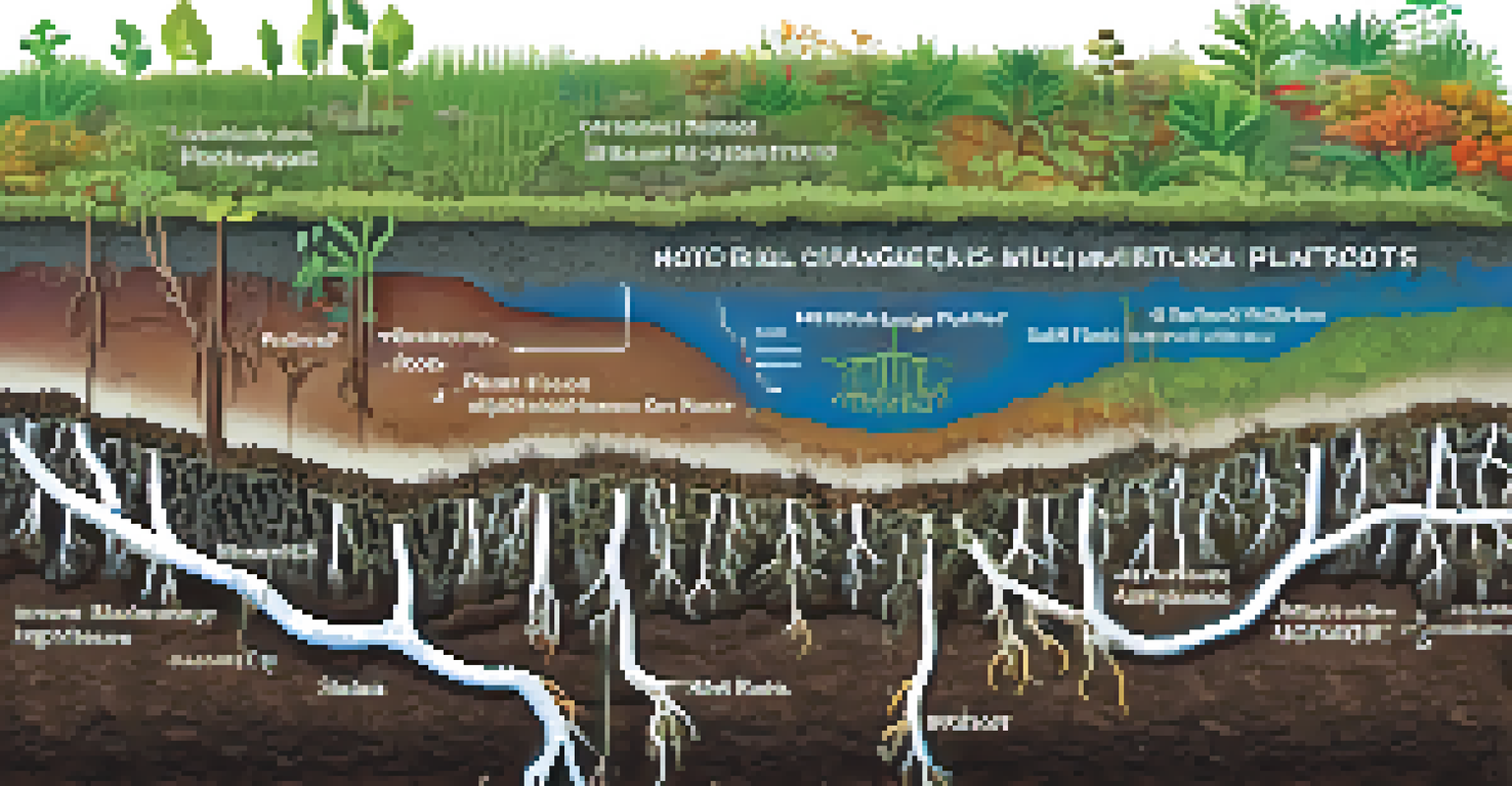The Impact of Soil Microbiome on Plant Disease Resistance

Introduction to Soil Microbiomes and Their Importance
Soil microbiomes consist of a diverse community of microorganisms, including bacteria, fungi, and viruses. These tiny organisms play a crucial role in maintaining soil health and fertility. By interacting with plant roots, they form a symbiotic relationship that enhances nutrient uptake and plant growth.
Healthy soils are the foundation of healthy food systems.
Understanding the soil microbiome is vital, especially as we face challenges like climate change and increased pest pressures. As agriculture evolves, so does the need for sustainable practices that leverage natural defenses. The microbiome serves as a powerful ally in this endeavor, helping plants resist diseases.
In this article, we will explore how the soil microbiome influences plant disease resistance and what this means for future agricultural practices. By tapping into this hidden world beneath our feet, we can better protect our crops and ensure food security.
The Composition of Soil Microbiomes
A healthy soil microbiome is composed of various microorganisms, each with unique functions. Bacteria, for instance, can break down organic matter, while certain fungi form mycorrhizal associations with plant roots. This diversity is essential for creating a resilient ecosystem that can adapt to environmental changes.

Different soils host different microbial communities, influenced by factors such as climate, land use, and management practices. These variations affect how well plants can fend off diseases. For example, a soil rich in beneficial bacteria may help suppress harmful pathogens, promoting overall plant health.
Soil Microbiomes Boost Plant Health
The diverse community of microorganisms in soil enhances nutrient uptake and plant resilience against diseases.
By studying these compositions, researchers can identify specific microbes that enhance disease resistance in crops. This knowledge opens the door to targeted biological interventions that can improve plant resilience in a sustainable way.
How Soil Microbiomes Enhance Plant Immunity
Soil microbiomes can enhance plant immunity through various mechanisms, including the production of antimicrobial compounds. These compounds can inhibit the growth of pathogens, effectively acting as a natural pesticide. As a result, plants with robust microbiomes are often healthier and more resilient.
The future of agriculture lies in understanding and harnessing the power of soil microbes.
Additionally, beneficial microbes can stimulate the plant's own immune responses. This interaction triggers a defense mechanism known as systemic acquired resistance, which prepares the plant to fend off future attacks. It's like a practice drill for the plant's immune system, making it more vigilant against threats.
The synergy between plants and their microbial partners is a fascinating area of research. By understanding these interactions, we can develop strategies to enhance plant health and reduce reliance on chemical treatments.
The Role of Mycorrhizal Fungi in Disease Resistance
Mycorrhizal fungi form a symbiotic relationship with plant roots, facilitating better nutrient absorption. This relationship not only promotes plant growth but also enhances disease resistance. By extending their hyphae into the soil, these fungi can outcompete pathogens for resources and space.
Research shows that plants associated with mycorrhizal fungi often exhibit improved resistance to soil-borne diseases, such as root rot. The fungi can also help plants recover more quickly from infections, acting as a buffer against stress. This dual benefit makes them invaluable in sustainable agriculture.
Sustainable Practices Enhance Diversity
Adopting sustainable agricultural methods promotes a healthy microbiome, improving crop resistance to pests and pathogens.
Moreover, mycorrhizal networks can connect multiple plants, allowing them to share resources and defense signals. This community approach to disease resistance reflects nature's interconnectedness and highlights the importance of preserving healthy soil ecosystems.
Impact of Agricultural Practices on Soil Microbiomes
Modern agricultural practices, such as monocropping and excessive chemical use, can significantly disrupt soil microbiomes. These practices reduce microbial diversity, weakening the soil's natural defenses against diseases. Consequently, crops become more susceptible to pests and pathogens.
Conversely, sustainable practices like crop rotation, cover cropping, and reduced tillage can promote a healthy microbiome. These methods encourage diverse microbial communities that enhance plant resilience. For example, incorporating legumes into crop rotations can boost nitrogen levels and support beneficial bacteria.
Adopting regenerative agricultural practices not only protects the microbiome but also leads to healthier soils and crops. By prioritizing these methods, farmers can build a more sustainable future while ensuring food security.
The Future of Soil Microbiome Research
Research into soil microbiomes is rapidly evolving, driven by advancements in technology and molecular biology. Scientists are now able to analyze microbial communities with unprecedented precision, shedding light on their roles in plant health and disease resistance. This knowledge is crucial for developing innovative agricultural solutions.
As we uncover more about these hidden ecosystems, we can better understand how to manipulate them for our benefit. For instance, bioinoculants—products containing beneficial microbes—are being explored as a way to enhance crop resilience. These products can help restore balance to disturbed soils and promote healthy plant growth.
Future Research Promises Innovation
Advancements in soil microbiome research are paving the way for innovative agricultural solutions and sustainable farming practices.
The future holds great promise for leveraging soil microbiomes in agriculture. By continuing to invest in this research, we can create sustainable farming practices that protect our environment and secure food production for generations to come.
Conclusion: Embracing Soil Microbiomes for Sustainable Farming
The impact of soil microbiomes on plant disease resistance cannot be overstated. By fostering healthy microbial communities, we can enhance plant resilience and reduce reliance on chemical interventions. This shift towards natural solutions aligns with the growing demand for sustainable farming practices.
As we embrace the role of soil microbiomes, it's essential to educate farmers and agricultural stakeholders about their importance. Practical applications of this knowledge can lead to healthier crops and more resilient ecosystems. This is a win-win for both farmers and the environment.

In conclusion, nurturing the soil microbiome is a critical step towards sustainable agriculture. By understanding and leveraging these natural allies, we can ensure that our food systems remain robust and capable of withstanding the challenges of the future.